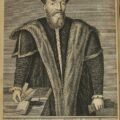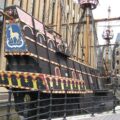Today is the anniversary of the death of Sir Francis Walsingham on 6th April 1590. Walsingham had an amazing career, serving Elizabeth I as a diplomat, secretary, adviser and spymaster.
Find out more about the man Elizabeth I called her “Moor” in this video, or in the transcript below, which is an extract from my book, On This Day in Tudor History.
On this day in history, 6th April 1590, Elizabeth I’s Principal Secretary, Sir Francis Walsingham, died at around the age of fifty-eight. Although he had served the queen for many years, he died in debt, as he had underwritten the debts of Sir Philip Sidney, his son-in-law.
Walsingham was an incredibly important man during Elizabeth I’s reign, being a statesman, private secretary, adviser, diplomat and spymaster, and he probably saved the queen’s life many times by uncovering various plots against her. Elizabeth called him her “Moor”.
He was born c.1532 (some say 1530) at Scadbury Park, Chislehurst, Kent, and was the son of William Walsingham and Joyce Denny. His father died when he was an infant, and his mother married Sir John Carey, a relation of Mary Boleyn, Anne Boleyn’s sister. Walsingham’s father was Common Sergeant of London, his mother was related to Sir Anthony Denny, a member of Henry VIII’s Privy Council, and his uncle, Sir Edmund, was Lieutenant of the Tower of London.
Walsingham studied at King’s College, Cambridge, and then, in 1550, he went abroad to continue his education. In 1552, he returned to England and enrolled at Gray’s Inn (The Honourable Society of Gray’s Inn, an Inn of Court). When Mary I came to the throne, Walsingham, who was a staunch Protestant, fled abroad and continued his law studies at the University of Padua, and then lived in Switzerland between 1556 and 1558.
Elizabeth I’s accession to the throne in 1558 meant that Walsingham could return to England. In 1559, his friendship with Sir William Cecil helped him to become a member of Parliament for Banbury, and then for Lyme Regis in 1563. In 1569, Walsingham was asked by William Cecil to investigate the Ridolfi Plot, and in 1570 Elizabeth I asked Walsingham to help the Huguenots in France negotiate with Charles IX, because he had built up a good relationship with them. In the same year, he became the ambassador to France, and it was to his house that Protestant refugees fled during the time of the St Bartholomew’s Massacre and other troubles.
Walsingham returned to England in 1573, and was rewarded for his hard work by being made the queen’s principal secretary, a position he shared with Sir Thomas Smith until 1576 when Smith retired. In 1577, he was rewarded again with a knighthood and was trusted with special embassies in 1578 and 1581 to the Dutch and French courts. In the late 1570s, Walsingham was known for his opposition to the plans to encourage Elizabeth I to marry the Duke of Anjou, and for his encouragement of military intervention in the Low Countries. In the mid to late 1580s, he and William Cecil worked on preparing England for war with Spain.
Although Walsingham was an important diplomat and the queen’s principal secretary for a time, he is best known as Elizabeth I’s spymaster, and for his successful work uncovering plots against the queen. He worked on uncovering the Ridolfi Plot, and put a stop to the Throckmorton (Throgmorton) and Babington Plots. It was the Babington Plot which convinced Elizabeth I of the need to execute Mary, Queen of Scots, and Walsingham was one of the advisers who encouraged her to take this course of action.








